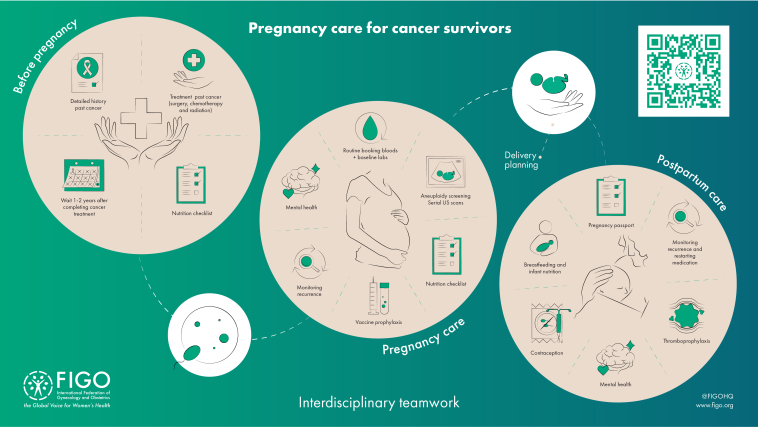Best practice advice on managing pregnancy after cancer treatment

The FIGO Committee on the Impact of Pregnancy on Long Term Health has published new best practice advice on managing pregnancy after cancer treatment in the International Journal of Gynecology & Obstetrics. Cancer treatment significantly impacts fertility, with survivors experiencing notably reduced pregnancy rates compared to the general population.
The guidance addresses the unique needs of the approximately two million women of reproductive age diagnosed with cancer globally each year, emphasising that with appropriate planning and care, many cancer survivors can safely pursue pregnancy.
Key recommendations include:
- waiting 1-2 years after completing cancer treatment before pursuing pregnancy, which allows for recovery and reduces the risk of cancer recurrence during pregnancy
- comprehensive pre-pregnancy assessment focusing on overall health and potential long-term effects of cancer treatment
- consultation with oncology teams to evaluate cancer recurrence risk before attempting conception
- individualised pregnancy care plans including specialised referrals to maternal-foetal medicine specialists or obstetric physicians
- appropriate monitoring during pregnancy, including special attention to foetal growth in the third trimester
- consideration of delivery method based on prior treatments, particularly for women who received radiation to the abdomen or pelvis
- tailored postpartum support, addressing mental health challenges and providing guidance on contraception and breastfeeding options.
This article is meant to guide obstetricians and pregnancy care providers with practical advice about the care of women who have been treated for cancer in the past. We are learning more about the impact of prior cancers and their treatments on the health of women and understanding the potential impact on subsequent maternal health during pregnancy. "
Dr Cynthia Maxwell, lead author and member of the FIGO Committee on the Impact of Pregnancy on Long Term Health
The advice also emphasises that while most women with a history of cancer treatment do not experience an increased risk of pregnancy complications such as miscarriage, stillbirth or hypertensive disorders, individualised care remains essential.
This guidance provides practical recommendations for healthcare providers in both high- and low-resource settings, promoting a life-course approach that considers both immediate pregnancy needs and long-term health outcomes for cancer survivors.